CYBER BLOCKADES
CYBER BLOCKADES
Alison Lawlor Russell
2014 Georgetown University Press. All rights reserved. No part of this book may be reproduced or utilized in any form or by any means, electronic or mechanical, including photocopying and recording, or by any information storage and retrieval system, without permission in writing from the publisher.
Library of Congress Cataloging-in-Publication Data
Russell, Alison Lawlor, author.
Cyber blockades / Alison Lawlor Russell.
pages cm
Includes bibliographical references and index.
ISBN 978-1-62616-111-5 (hardcover : alk. paper) ISBN 978-1-62616-112-2 (pbk. : alk. paper) ISBN 978-1-62616-113-9 (ebook)
1. Cyberterrorism. 2. CyberterrorismPrevention. 3. CyberspaceSecurity measures. 4. Computer security. I. Title.
HV6773.15.C97R87 2014
327.117dc23
2014011280
Cover design by Bruce Gore | Gore Studio, Inc. Image is by Shutterstock.

This book is printed on acid-free paper meeting the requirements of the American National Standard for Permanence in Paper for Printed Library Materials.
15 14 9 8 7 6 5 4 3 2 First printing
Printed in the United States of America
For my parents Joseph and Susan Lawlor,
&
for my husband Kevin
Contents
CHAPTER 1
Networks of Power in the Information Society
CHAPTER 2
Theorizing about Cyberspace
CHAPTER 3
Evolution of Blockades in Different Domains
CHAPTER 4
Cyber Attacks on Estonia
CHAPTER 5
The Georgia-Russia War
CHAPTER 6
Comparing Cyber Blockades
CHAPTER 7
Conclusion
Tables and Figure
Tables
Figure
Acknowledgments
This research originally took form as a doctoral dissertation at the Fletcher School at Tufts University. I offer my profound thanks to Andrew Hess, Bill Martel, and Robert Pfaltzgraff Jr., who scrutinized the manuscript when it was in early forms and provided essential insights, critical analysis, and recommendations for improvement. Bernadette Kelly-Lecesse was a pillar of support. Many colleagues offered essential critiques and suggestions, particularly Chris Wrenn and Tom McCarthy, who encouraged me to write on this topic in the first place and generously shared their time and resources with me. This book could not have been written without the assistance of friends and colleagues who challenged my ideas and improved this work along the way, but any errors are my own.
Abbreviations and Acronyms
| |
|---|
CERT | Computer Emergency Response Team |
DDoS | distributed denial of service |
DoS | denial of service |
EC | European Commission |
EMP | electromagnetic pulse |
ENP | European Neighbor Policy |
EU | European Union |
FSB | Federal Security Service (Russia) |
GRU | General Staff of the Armed Forces (Russia) |
HAMP | high-altitude electromagnetic pulse |
HMP | high-power microwave |
IP | internet protocol |
IR | international relations |
ISAF | International Security Assistance Force |
ISP | internet service provider |
IT | information technology |
MAP | Membership Action Plan |
Mbps | Megabits per second |
NAC | North Atlantic Council |
NATO | North Atlantic Treaty Organization |
NFZ | no-fly zone |
OSCE | Organization for Security and Cooperation in Europe |
PCA | Partnership and Cooperation Agreement |
RBN | Russian Business Network |
SQL | search and query language |
TCP SYN | transmission control protocol synchronize message |
UAV | unmanned aerial vehicle |
UK | United Kingdom |
UN | United Nations |
UNSCR | United Nations Security Council Resolution |
US | United States |
USSR | Union of Soviet Socialist Republics |
CHAPTER 1
Networks of Power in the Information Society
Introduction
All of a sudden and without warning, cyberspace shut down. At first, people noticed that their desktops, laptops, and tablets were not responding to search requests or pinging with incoming email. Then they realized their smartphones had no data reception and no telephone service. Landlines (the plain, old telephone service) did not work either. The electrical grid and other basic services were compromised, affecting virtually everything, from digitally programmed home thermostats to gas stations to power plants to water treatment facilities. Financial markets cannot operate without a reliable connection to cyberspace, so the stock market closed early. Navigation and monitoring systems in cars, trains, and airplanes around the country simply did not work and there were massive closures of public transportation systems and airports. Most businesses closed down because they could not access their databases or execute transactions in a reliable fashion.
The government was alarmed because it was operating in the dark; its systems were down in offices around the country and it could not receive any information from beyond its borders. In the previous weeks and days the government had entered a period of heightened tensions with an adversary and received threats of attack by foreign forces. But now the government could not send or receive information from beyond its borders, even from its own embassies and troops stationed abroad. It could not access the government-controlled, secure, closed networks or satellite systems to get a visual look at what, if anything, was happening in and around the country.
Computer experts were working furiously to determine the origin of what they realized was the largest cyber attack in history, but they were working with limited capabilities within the borders of the target state and could not receive information or help from outside of the country. No one knew how long the situation would last or what they should do in the meantime. Banks and automatic teller machines could not function and credit cards would not work, so people were limited to the cash they had in their pockets when they left the house that morning, the food in the pantry, and the gas in their cars. Doctors could not access the medical records of their patients and diagnostic tests could not be performed on the critically ill. Emergency response systems could not function. The entire nation experienced a cyber blackout that disrupted the political, economic, social, and military operations of the country.

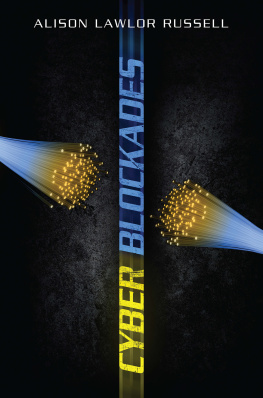

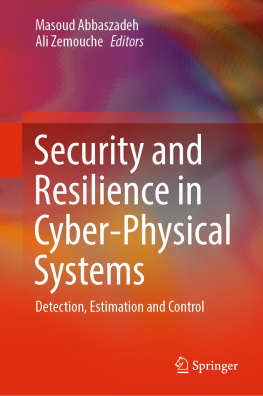
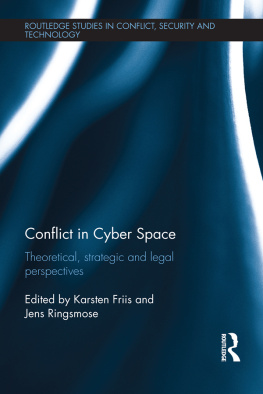
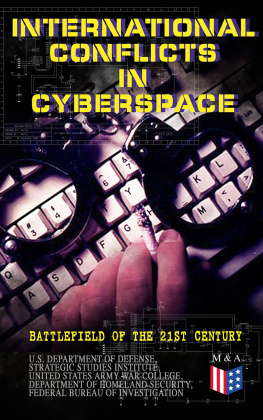
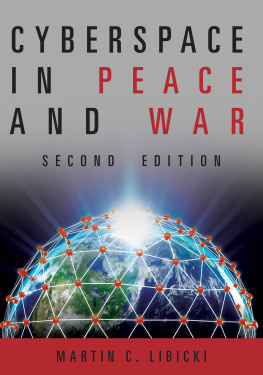

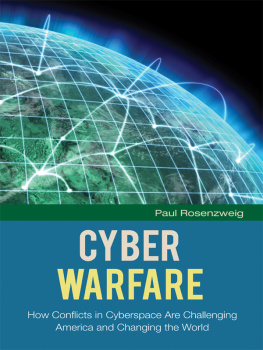
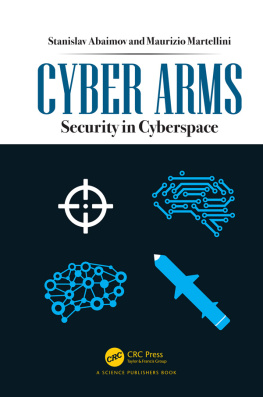

 This book is printed on acid-free paper meeting the requirements of the American National Standard for Permanence in Paper for Printed Library Materials.
This book is printed on acid-free paper meeting the requirements of the American National Standard for Permanence in Paper for Printed Library Materials.